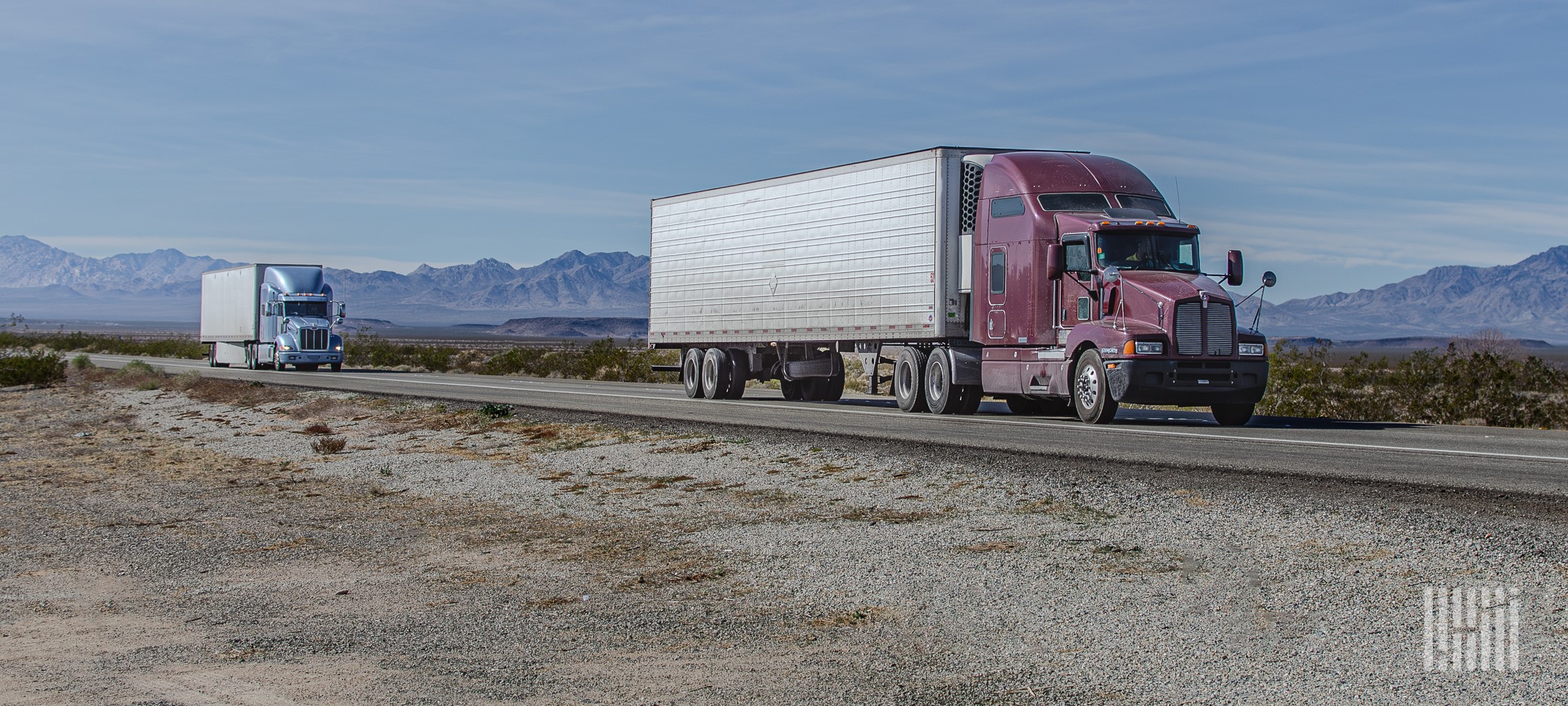In the world of logistics and transportation, precision and efficiency is a priority.
A GPS trailer tracking system can revolutionize the way trailers are managed and provide a host of benefits that can improve fleet operations. But just like with any new technology, it’s important to understand the full picture, weighing the pros against cons before making a decision.
If you’re in the industry and looking to stay ahead of the curve, this detailed exploration of GPS trailer tracking systems is for you.
And when you’re finished, check out the other articles in our ‘trailer tracking GPS’ series:
- How trailer tracking GPS systems work
- Benefits of using a GPS tracking device for trailers
- The pros and cons of a GPS trailer tracking system
- Best GPS trackers for trailers in 2024
The technology behind GPS trailer tracking
At its core, a GPS trailer tracking system is a mix of hardware and software that uses global positioning technology to monitor and manage trailers remotely.
The system typically includes GPS devices installed on trailers, a fleet management system or software, and a user interface that allows real-time monitoring.
- GPS devices: Compact and durable, these devices are installed on each trailer. They use a combination of GPS, cellular, and sometimes satellite networks to relay location and other data.
- Fleet management software: The software’s role is to interpret the data from GPS devices, giving fleet managers a comprehensive view of trailers in real-time.
- User interface: This is the dashboard that can be accessed by fleet managers and other authorized personnel. It displays various metrics, from location to temperature, and door openings of a trailer.
The pros of GPS trailer tracking systems
1. Enhanced security and theft recovery
One of the most significant advantages of a GPS trailer tracking system is the security it offers. With the ability to track the location of trailers around the clock, it becomes much easier to recover stolen trailers and their contents.
The system’s alerts can be particularly effective, notifying owners the moment a trailer is moved without authorization.
2. Operational insight and efficiency
For fleet managers, the ability to keep a close eye on their trailers can be a game-changer. Detailed reports on usage, maintenance, and idle time can provide insights that lead to more efficient operations and cost savings. By optimizing routes and ensuring timely deliveries, companies can significantly improve their bottom line.
3. Compliance and safety features
Keeping up with regulations and ensuring the safety of both drivers and cargo is a non-negotiable aspect of the trucking industry. GPS trailer tracking systems help in this by ensuring drivers follow routes, making it easy to recover lost trailers, and alerting them to any accidents or sudden stops, potentially saving lives and mitigating risk.
4. Customer service and satisfaction
Timely and precise deliveries are critical to customer satisfaction. GPS tracking systems can help ensure deliveries are made on time and in the best condition. Real-time updates on delivery routes can also be passed on to customers, enhancing their experience with the company.
The cons of GPS trailer tracking systems
1. Cost of implementation and maintenance
Deploying a GPS trailer tracking device is an investment. From the cost of the devices and software to installation and training, there are upfront expenses. Ongoing maintenance and potential subscription fees for software updates add to the cost over time.
2. Privacy concerns
The implementation of a GPS tracker for trailers inevitably leads to privacy concerns, both for drivers and personal data stored within the system. Companies must be transparent about how the data is used and ensure it is protected from unauthorized access.
3. Technical glitches and downtime
Like any technology, trailer GPS tracking systems are prone to technical issues. These problems could lead to inaccurate data, system downtime, or the need for unexpected maintenance. All of this can disrupt fleet operations and create unanticipated costs.
4. Workforce adoption and management
Implementing new technology requires buy-in from the workforce. Drivers and employees might resist change, or there may be a learning curve associated with the new system.
Additionally, managing and interpreting the data can be a new responsibility for the current workforce, requiring additional training.
Case studies and success stories
To truly appreciate the impact of GPS trailer tracking systems, it’s helpful to look at real-life applications. For example, a refrigerated trailer company could significantly reduce spoilage by maintaining the correct temperature at all times, thanks to real-time alerts from their tracking system.
Choosing the right GPS trailer tracking system
To select the ideal GPS trailer tracking system for your fleet you must compare prices and brands and understand the unique needs of your operation and how each system’s features can address those needs.
When considering a new GPS trailer tracking device, prioritize solutions that offer the mix of functionality, security, and integration capabilities highlighted above. Evaluate each option in the context of how it will:
- Enhance your operational efficiency
- Protect your assets
- Provide actionable insights through data
- Integrate with your current technological infrastructure
Vetting your potential partners
It’s crucial to partner with a provider that offers scalable solutions, capable of adapting to your business’s growth and evolving requirements.
Pay close attention to their customer service and support structures. A provider that values your business will ensure that you maximize the value of your investment.
Additionally, engaging with other users through forums or product reviews can provide valuable insights into the system’s real-world reliability and performance.
Conduct a cost-benefit analysis
Investing in a GPS trailer tracking system is a significant decision that should be backed by a thorough cost-benefit analysis.
This evaluation should encompass the upfront cost of the system along with the potential savings and efficiencies gained. Consider factors like the reduction in cargo theft, improved fuel efficiency, decreased downtime, and enhanced customer satisfaction.
Quantifying these benefits can help in making a well-informed decision. Additionally, a scalable solution that grows with your business ensures that the benefits continue to outweigh the costs in the long term.
Legal and compliance considerations
Navigating the legal landscape is essential when implementing a GPS trailer tracking system.
Regulatory compliance, especially concerning privacy laws and data protection, must be at the forefront of your deployment strategy. Ensuring that your tracking practices are in line with regulations protects your business from potential legal challenges and reinforces your commitment to ethical operations.
Regularly updating your policies and staying informed about changes in legislation can help in maintaining compliance and safeguarding your reputation in the industry.
Ultimately, the right GPS trailer tracking system is one that fits your budget, exceeds your operational needs, and is backed by a responsive and knowledgeable support team.
By carefully considering these factors, you ensure a wise investment that will contribute significantly to the security and efficiency of your logistics operation.
Future-proofing
Opting for a system that is adaptable and capable of integrating with future technologies can extend its useful life and enhance its value. Investing in a system that is built for the future ensures that your fleet remains at the cutting edge of logistics and fleet management, offering competitive advantages for years to come.
Does a GPS trailer tracking system make sense for you?
While GPS trailer tracking systems offer valuable benefits, it’s important to be fully informed of potential drawbacks before deciding whether to make the investment. Ultimately, it comes down to how well the solution aligns with your specific needs and priorities.
With thoughtful consideration, GPS trailer tracking can be a powerful tool for enhancing logistics and security for those transporting valuable cargo.
FAQ
Yes, GPS trackers typically require a subscription service to enable the tracking and monitoring functionality. The subscription provides access to the software platform that receives and displays the location data from the GPS devices.
A trailer GPS works by utilizing a global navigation satellite system to pinpoint the trailer’s precise location coordinates. This location data is then transmitted via a cellular or satellite network to a central tracking platform, allowing fleet managers to view the trailer’s movements in real-time.
The monthly cost of GPS trackers can vary significantly depending on the service provider, features included, and the number of assets being tracked. Basic GPS tracking plans may start around $20-$30 per month per asset, while more advanced fleet management solutions can cost $50 or more per month per vehicle or trailer.
We are excited to announce the launch of move.freightwaves.com, a revolutionary resource designed to transform how consumers choose auto-shipping companies. Check it out today!



